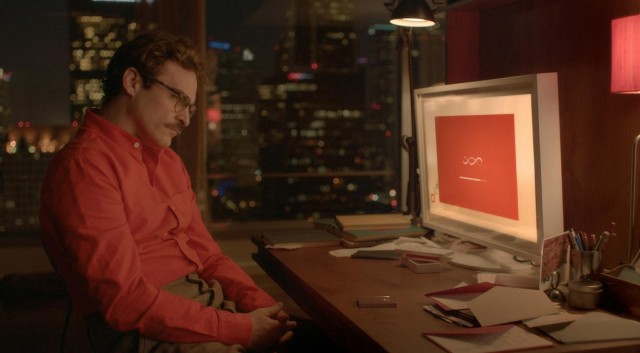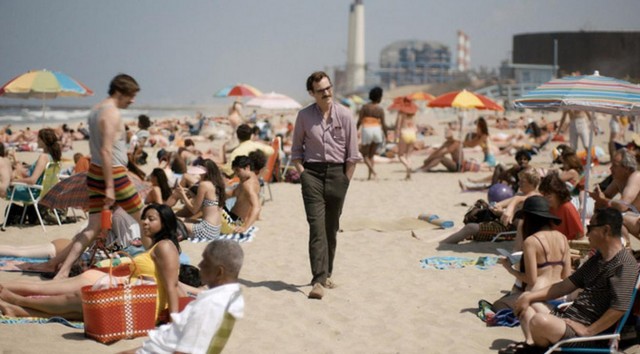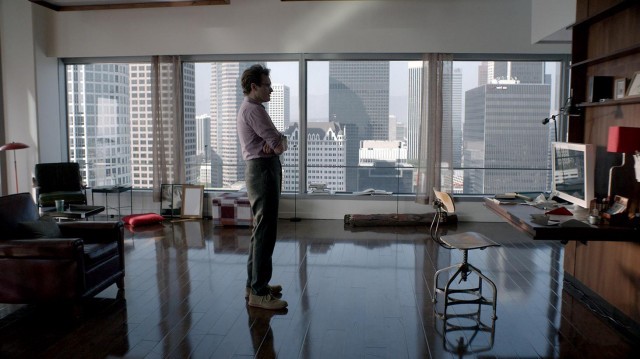"Her": This Movie Makes No Sense

“When we were in pre-production we started thinking about how we were going to create future L.A., and was I was excited by the idea of collaging two cities together and so we ended up going to Shanghai and using very specific, curated areas of Shanghai with very specific curated areas of Los Angeles and I think… it was this idea that we were trying to make this very warm, tactile world, with the materials and fabrics and the woods, and create this world that felt like this utopic world that everything’s nice and everything’s comfortable and even in this world where you’re getting everything you need and having this nice life, there’s still loneliness and longing and disconnection.” — Spike Jonze in a recent interview discussing Her.
There is a lot to love about the new Spike Jonze movie, Her, which goes into wide release today, but there is still more to become hair-tearingly exasperated about. If it weren’t for the gushing torrents of praise this movie is getting I guess I wouldn’t care so much about the exasperating parts, because I freely admit that it is a very seductive movie, visually; it looks like soft old bleached-out polaroids in the colors of fruit and candy and clear water and the most perfect reddest red everywhere, plus Scarlett Johansson is talking all the time, and Joaquin Phoenix acting all human, so human and lovable, and I guarantee you every sensitive male in Western Civ. is going to be wearing those high-waisted clumsy thick woolen trousers for years and years to come and I love those trousers already. As a visual tastemaker Spike Jonze, for all his reedy, goofy voice and his geeky demeanor, is a freak of nature, a genius, a god.
But as a writer, Jonze is unbelievably terrible. Horrifying. Surely I can’t be the only one to have noticed this?
The movie’s hero, Theodore Twombly, presumably takes his name from the artist Cy Twombly, whose esoteric works were often based in matters to do with text, writing, literature, palimpsest and so on. (Plus forbidden passion: Twombly was gay, and lived during a period when pretty much every gay person in America was imprisoned in the closet.) Maybe Jonze means us to think of Theodore Twombly as a taster of the forbidden fruit, but in the form of an “operating system,” played in the film by the luscious, disembodied voice of Scarlett Johansson. In any case, the movie is intimately concerned with writing. How personal and intimate writing looks or should look, what it is for, and it’s also concerned with imitations of the personal and intimate.
We’re meant to believe that Twombly is a sensitive, gifted writer of “touching,” faux-intimate sentiments; it is frankly incredible that so many critics, professional writers themselves, people who watch movies and write for a living were willing to buy this proposition. In fact, at bottom the hackneyed, infantile writing of Twombly underscores a terrible solipsism, a real, modern solipsism that is romanticized in a way that embodies the toxicity of modern life, and there’s nothing soft or clean or pleasurable about it at all. The central conceit of the movie, the “relationship” between a human whose job it is to be a fake human and a machine whose job it also is to be a fake human, is entirely superficial, paper-thin, sold to the viewer with beautiful closeup photographs of a guy whose job it also is to be a fake human.
Okay, fine. Let’s begin with Twombly’s job as a professional empath who writes intimate letters for pay for a company called BeautifulHandWrittenLetters.com. Would you like to receive a very intimate letter, about the most intimate things in your life, ostensibly from someone who “loves” you — but it is a letter in fact written by some beautifully-dressed rando emoting in a cubicle?!
Wouldn’t this be about five zillion times worse than receiving no letter at all?
At some point Twombly writes a love letter (and this is his apparently well-paying job, in this strange future! — the cynicism of this is really breathtaking), mentioning the beloved’s “crooked little tooth.” Let it be clear that Twombly himself noticed the tooth in question; he wasn’t asked to write about it by the person paying for the service.
Rachel I miss you so much it hurts my whole body. The world is being unfair to us. The world is on my shit list. And is this couple that is making out across from me in this restaurant I think I’m going to have to go on a mission of revenge and I must beat up the world’s face with my bare knuckles, making it a bloody, pulpy mess. And I’ll stomp on this couple’s teeth reminding me of your little sweet little cute crooked tooth that I love.
From a literary point of view: bleah. So ghastly. But still worse, if I ever received such a letter, with such a false intimacy bought and paid for by someone who couldn’t be bothered to notice my “crooked little tooth” but preferred to pay for someone else to do so, I swear to god I would crown the responsible party with a frying pan. Divorce! would be the only response to a betrayal like that. I am so seriously not kidding, it is so toxic and upsetting, such a travesty of what connection between two people really is… I don’t even know, what is it with all these awards?! For this movie?!? I am so upset!

In a world where machines can talk like Scarlett Johansson, we’re asked to believe that someone would pay another person to write love letters for him. At this point I am gathering that algorithms have gotten pretty good at imitating human speech, but for some reason you don’t buy software to help you write a private love letter, you give all your family photos to these clowns so they can invent utterly cloying pretend-emotions for you to put your name to.
Also, this letter-writing gig pays so much that letter writers can live in an enormous apartment in huge comfort.
Here is another Twombly!
To my Chris I’ve been thinking how I could possibly tell you how much you mean to me. I remember when I first started to fall in love with you like it was last night. Lying naked beside you in that tiny apartment it suddenly hit me that I was part of this whole larger thing, just like our parents our parents’ parents before that I was just living my life like I knew everything; but suddenly this bright light hit me and woke me up. That light was you. I can’t believe it’s already been fifty years since you married me and still to this day, every day, you make me feel like the girl I was when you first turned on the lights and woke me up and we started this adventure together. Happy anniversary my love, my friend till the end.
Then, this professional writer Twombly permits a piece of software to judge his emails and get rid of “thousands” of them, leaving him only 86. Emails approved of by a piece of software — emails that the software deems funny and worth keeping. This is absolutely non-possible, not even the worst writer on earth would submit to having his work pruned by a machine, not even a machine that sounds like Scarlett Johansson. But Twombly just laughs and is all, okay! I really do not think that Spike Jonze has much respect for writers. Or writing.
One gathers that Jonze is not super conversant with computers, either, because his choice of the term “operating system” to describe the “personalized” AI portrayed by Johansson points straight to the film’s central paradox, one we can see coming from miles away: an operating system is necessarily a one-size-fits-all proposition, parsing files for everyone’s sharing and consumption. Twombly’s infatuation with the machine-generated Samantha is not quite credible for the very reason that an operating system is a lingua franca, inevitably. You can’t really have it both ways, having an imperceptibly perfect human simulacrum that can pass all the Voight-Kampff tests in the world with flying colors, and not have considered the “operating system” problem. So why not call a personalized computer personality — one designed to learn to speak to just one person — a User Interface instead? Make it unique to the user… that shouldn’t be difficult, granting this kind of technological sophistication? Maybe that is a quibble.
When, as you know, Twombly begins to date his computer voice, there is not much in the way of hubbub. Lots of people are doing it, apparently, though we’re never given a glimpse of the world beyond Twombly’s shoulder (not even a whiff of social media). Now imagine your best pal casually mentioning to you, “I am dating a personal assistant program with a sexy voice.” “Dating”! What a fun talk that would be!
One friend who saw the movie told me he found it touching, this general “tolerance” of “dating” a telephone, thoughtfully propped up on a picnic blanket so that “she” can participate. I just found it perplexing. Reminds me of those lyrics from Patience, “an attachment a la Plato to a bashful young potato/Or a not-too-French french bean.” The sexlessness of the late-nineteenth-century aesthetic pose is alive and well, it appears.

But let’s not shortchange her. The machine-Johansson, Samantha, also composes music. Music supervised by the Arcade Fire! What a wheeze. The humanest thing, the thing no computer an imitate, a person playing the piano. Hesitations, pauses, hands, you can almost feel the blood circulating under the skin, all translated into sound. To pretend that this music could have been written by a computer! It is clever, so clever and false.
There’s this guy at work who admires Twombly’s empty words so much. (A dull receptionist who begins dating a beautiful lawyer, no less — the future is beyond egalitarian.) I guess he is meant to represent “the little people” who would actually buy the products of BeautifulHandwrittenLetters.com. He eavesdrops on Twombly writing yet another godawful, sticky-sweet Hallmark card of a letter and is all awestruck and he goes, “That’s beautiful… I wish somebody would love me like that. I would be really stoked to get a letter like that. Like if it was from a chick [any chick!!!!! what the hell!] but written by a dude, but still from a chick, that would still be sick. But it would have to be a sensitive dude. It would have to be, like, a dude like you; You are part man and part woman; like there’s an inner part that’s a woman.”
That is the center of the solipsism of this movie. Part man and part woman, Theodore Twombly is a sealed-off, hermaphroditic whole. Other people (and The Machines) may be permitted to take part in the touching love affair between Theodore Twombly and himself, but this professional empath is ultimately performing for himself alone. My innards are still writhing like a nest of snakes just thinking about it.
Maria Bustillos is a journalist and critic in Los Angeles.
